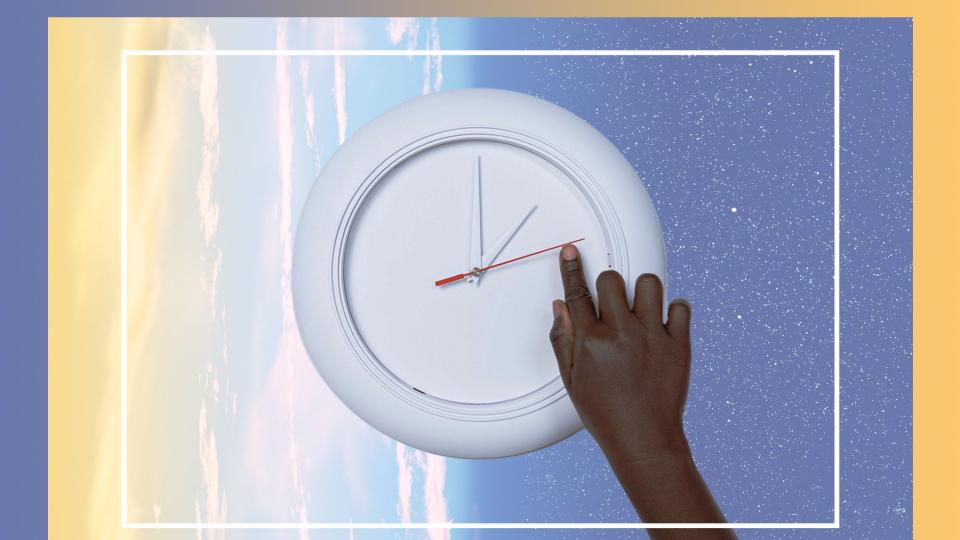How Daylight Savings Time Can Seriously Affect Your Body
You may wonder how much Daylight Savings Time (DST) really affects you. Sure, waking up for work on Monday will be tough, and you might feel a little groggy throughout the morning — but by noon, you're back to normal…right?
Not exactly. Interruptions in your sleep routine can impact your circadian rhythm or the 24-hour clock in your brain that regulates your sleep-wake cycle, says Frida Rångtell, Ph.D., sleep educator and science advisor at Sleep Cycle. Your circadian rhythm is influenced by environmental light exposure, and when the transition to DST begins, the sun rises later (think: 7 a.m. instead of 6 a.m.). As a result, your circadian rhythm (which makes your body feel alert or sleepy) becomes out of sync with the time on the clock, she explains. "This could make going to bed or waking up at our usual times a bit difficult," says Rångtell. "Just because we decide to change the time on the clock, that doesn't mean that our internal clock and 'sun clock' will automatically adapt. This process will take some time."
What's more, there are certain factors that can make you feel even worse when the clocks spring forward. First, since DST falls on a weekend, you've probably slept in for a day or two — which means it feels as if you're losing more like two or three hours, says Pete Bils, vice president of sleep innovation and clinical research at Sleep Number. "Plus, most Americans are sleep-deprived already," he says. "Add another hour on top of that, and it puts a lot of people in the danger zone."
And this "danger" from getting less sleep — and the resulting stress — can actually be pretty serious. "After transitioning [to DST], there may also be increased risks of car accidents, cardiovascular disease [think: heart attacks, ischemic strokes], and negative mood changes," says Rångtell.
The type of sleep you're missing matters too, says Bils. Throughout the night, your cycle through two different types of sleep, rapid eye movement (REM) sleep and non-REM sleep, several times, and as you get closer toward the morning, you'll experience increasingly longer, deeper REM periods, according to the National Institutes of Health. During DST, you could lose Zs from the REM period because you wake up an hour earlier than you normally would. The problem: REM sleep impacts nearly every aspect of brain function, including creativity, emotional stability, and even pain tolerance, says Bils. As a result, on Sunday, Monday, and Tuesday you may find yourself struggling with writers' block, snapping at loved ones, road raging, and crying over (mental and physical) hurts you might otherwise shake off.
When you're sleep-deprived, you also experience a spike in evening cortisol levels, adds Bils. This surge might make you feel stressed or even make it more difficult to drift off when you go to bed at night. But this is more pronounced if you've been skimping on shuteye for a while due to a condition like insomnia or sleep apnea.
Another possible side effect of DST: your cravings are harder to ignore. The reason is two-fold, explains Bils. Poor sleep can negatively affect self-control, and also it causes your brain to produce less leptin, a hormone that suppresses your appetite, and more ghrelin, a hormone that revs hunger. So if you have trouble turning down the donuts someone brings into your Monday morning meeting, blame it on DST.

Photo by cottonbro from Pexels
How to Reduce the Impacts of Daylight Savings Time
So what can you do about it? The best way to minimize the negative effects of losing an hour of sleep is to prep now. In the days leading up to DST, make sure you get your full eight hours — or whatever amount of sleep you typically need to function — so your body's prepared for a few days of less sleep once the time change begins, says Rångtell. "Making sure that we have a good evening routine in place before DST and going to bed on time, or slightly earlier than usual, can help reduce the shift that comes with DST," she adds.
Once DST begins, try to soak up as much natural daylight as possible, which can help "reboot" your circadian rhythm, says Rångtell. And on Sunday, Monday, and Tuesday, Bils recommends throwing open the blinds and flipping on the brightest lights in your house as soon as you wake up. "Light tells your brain to completely shut off melatonin, which makes you feel sleepy, to reset your clock faster," he explains.
In those first few days, also consider limiting your caffeine intake after lunch, which can help increase your "sleep pressure," or the feeling that you're ready to go to sleep, later in the evening, says Rångtell. Half an hour before bedtime, avoid activities that make you feel alert, such as scrolling through Instagram, reading the news, or binge-watching Bridgerton, she adds. "If you're watching your favorite TV show or stimulating your brain with exciting content, you are more likely to lose track of time and stay up past your bedtime, or have a harder time winding down by bedtime, which could cause you to lose even more sleep," says Rångtell.
And if you feel like you're running on empty the day after the DST transition, don't feel guilty about taking a good 'ol nap. "If you feel very tired, a short nap in the early afternoon can help restore some alertness and cognitive performance," says Rångtell.

